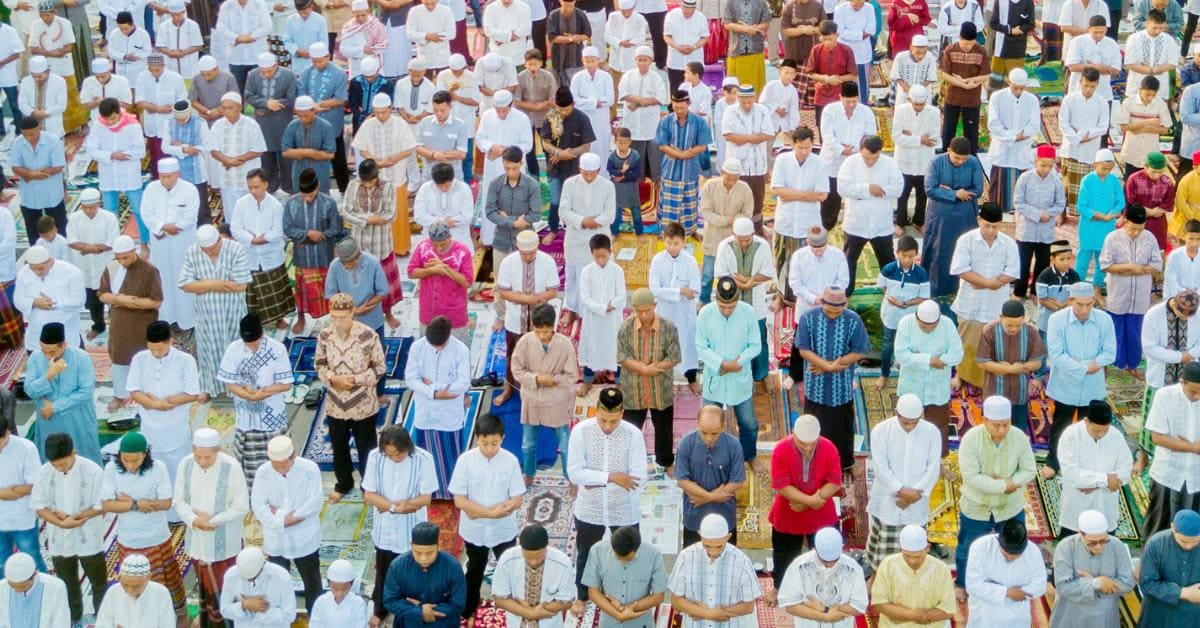Ramadan is an important religious observance for Muslims, which marks the ninth month of the Islamic calendar. This period of spiritual reflection and fasting involves abstaining from food and drink during daylight hours.
As such, it is a time for introspection, charitable acts, and being with family.
While many non-Muslims may not observe Ramadan themselves, they can still show respect to those who do by understanding its significance and offering appropriate greetings.
In this article, we will explore the reply to Ramadan Mubarak to non muslims and discuss how non-Muslims can respectfully reply to their Muslim friends or colleagues who offer these well wishes.
We will also offer examples of respectful replies that demonstrate appreciation, understanding, education, and action.
Reply To Ramadan Mubarak To Non Muslims: Reply graciously with a warm message like, “Thank you for your kind wishes. May you have a blessed month as well,” to show respect and appreciation for their greeting during Ramadan.
Overview of Ramadan

Ramadan is an Islamic holy month that occurs during the ninth month of the lunar Islamic calendar when Muslims observe fasts from dawn until sunset. During this time, Muslims abstain from food and drink as a way to come closer to Allah.
Ramadan also serves as a time for spiritual reflection and prayer. Additionally, it is an opportunity for family and friends to come together in fellowship, often with meals shared at the end of each day’s fast.
For those who are not Muslim, Ramadan provides an opportunity to learn more about Islam through conversations with observant Muslims or by reading books on the subject.
Respectful questions about customs and traditions are welcomed by observant Muslims, who can provide further insight into their faith traditions.
Cultural Etiquette
When observing a cultural event such as Ramadan, it is important to acknowledge the festivities with an appropriate response that respects the beliefs of those celebrating.
For non-Muslims, wishing someone a “Ramadan Mubarak” may not be culturally appropriate. Instead, a more inclusive phrase might include phrases such as: “Happy holidays” or “Have a blessed month.”
Furthermore, in many cultures, it is seen as impolite to ask about one’s religious beliefs or practices. When greeting someone during Ramadan, instead of asking what religion they are, use more general conversation topics such as their plans for the holiday season or how their family is doing.
Additionally, showing respect for another culture can be done through small gestures like learning some words in Arabic and using them when interacting with people who celebrate Ramadan.
Overall, by being respectful and understanding of different cultures during special occasions like Ramadan, we can foster a sense of belonging amongst all members of society.
Respectful Replies

During Ramadan, it is important to be mindful of cultural etiquette and respond respectfully to those who are celebrating.
Non-Muslims should demonstrate respect for the Islamic holiday by responding positively when greeted with Ramadan Mubarak.
A powerful response could be “Ramadan Kareem”, which translates to “Have a generous Ramadan”.
This phrase acknowledges and honors the other person’s faith while expressing good wishes for their celebration.
Additionally, non-Muslims can show respect for the holy month by avoiding eating or drinking in front of Muslims during daylight hours.
Refraining from activities such as smoking or drinking alcohol may also help create an atmosphere of understanding and appreciation for different cultures.
Finally, non-Muslims can engage in conversation about Ramadan and ask questions that demonstrate interest in learning more about Islam and the practices associated with this holy month.
Additional Greetings
Ramadan and Eid are two important holidays celebrated by Muslims around the world.
Ramadan is a month-long period of fasting, prayer, reflection, and community, beginning in the ninth month of the Islamic calendar.
On completion of this holy month, Eid al-Fitr is celebrated to mark the end of Ramadan and thank Allah for his blessings.
Similarly, Eid al-Adha marks the end of the Hajj pilgrimage to Mecca and also serves as a reminder of Prophet Ibrahim’s willingness to sacrifice his son Ismail upon God’s command.
Ramadan Kareem
The holy month of Ramadan is a time of reflection, mercy, and spiritual growth. Muslims around the world observe this sacred period by fasting from sunrise to sunset for 30 days. This allows them to focus on their relationship with Allah and practice self-discipline.
In addition, many Muslims recite special prayers during Ramadan and give charity generously. To wish someone a blessed Ramadan, one can say ‘Ramadan Kareem,’ which translates to ‘May you have abundance in the Month of Ramadan.’
For non-Muslims, wishing them ‘Ramadan Kareem’ is an excellent way to express your respect for their beliefs and foster understanding between cultures.
Eid Mubarak

After the month of Ramadan passes, Muslims celebrate Eid al-Fitr. This is a time of joy and celebration when family and friends come together to exchange gifts and enjoy each other’s company.
For non-Muslims, this is a time to show solidarity with their Muslim friends by wishing them ‘Eid Mubarak’, which translates to ‘Happy Eid’.
Saying this phrase acknowledges that while non-Muslims may not share the same faith as their Muslim counterparts, they still recognize the importance of celebrating a meaningful event for them.
This simple act of kindness can go a long way in strengthening relationships between different cultures and promoting acceptance among people from all backgrounds.
Examples of Respectful Replies
Respectful replies to Ramadan Mubarak can include messages of acceptance and understanding. Acknowledging the religious significance of Ramadan while expressing appreciation for the holiday wishes is a good approach.
It can be as simple as saying, “Thank you for your warm wishes” or “I appreciate your kind words.”
When replying to those who do not share similar beliefs, it’s important to remember that each person has their own culture and values. Respectfully recognizing these differences by wishing them well in an appropriate non-religious manner is recommended.
For example, say something like “Wishing you peace and joy this season” or “I hope you have a wonderful time with family and friends during this special time of year.”
Showing respect helps create stronger relationships based on mutual understanding and admiration.
Showing Respect Through Appreciation
The appreciation of Ramadan Mubarak is a respectful way to acknowledge the holiday and its significance for Muslims.
During the holy month, many Muslims practice self-discipline and spiritual growth through fasting, prayer, and charity.
Non-Muslims can show their respect by expressing an understanding of this significant event in Islamic culture.
Appreciation could include acknowledging the importance of Ramadan to those who observe it or wishing them a peaceful observance.
Additionally, recognizing the courage that comes with observing such a difficult yet rewarding fast can be an effective form of showing respect for their beliefs and traditions.
Showing Respect Through Understanding
Acknowledging the traditions and beliefs of those who observe Ramadan Mubarak is an essential component of exhibiting respect.
This includes understanding the significance of Ramadan for Muslims, which marks a month-long period of spiritual reflection, prayer, and fasting.
Showing respect for this special time can be done by learning more about it and having conversations that demonstrate empathy and understanding.
It’s about recognizing that although we may not all share the same beliefs or customs, we still have common values such as peace, love, and mutual respect.
To show true acceptance of those observing Ramadan Mubarak requires being open to new experiences and learnings rather than simply coexisting without any attempt to understand each other better.
Showing Respect Through Education

Educating oneself about Ramadan Mubarak is a key component of showing respect to those who observe it.
In this way, non-Muslims can be more mindful and understanding of the religious holiday and its traditions.
Reading about the holy month, for example, allows one to gain insight into the practices and rituals that accompany it and to appreciate the significance it holds among Muslims around the world.
Taking time to learn why people celebrate Ramadan Mubarak provides an opportunity for meaningful dialogue between faiths or cultures.
Additionally, learning about Ramadan Mubarak can help foster feelings of inclusion by providing non-Muslims with an understanding of how they can support their Muslim friends during this special period in their faith year.
Ultimately, education is a powerful tool for building bridges between communities by allowing us to develop a deeper appreciation for each other’s beliefs and traditions.
Showing Respect Through Action
Actively demonstrating respect for Ramadan Mubarak can be achieved through engaging in meaningful actions. This could include taking part in Ramadan-related activities, such as fasting and attending iftar (evening meal) gatherings.
Additionally, being aware of the month’s significance to the Muslim community can help show a commitment to understanding and respecting their culture.
Furthermore, engaging in conversations about Ramadan Mubarak and actively listening to others’ perspectives demonstrates openness and interest in learning more.
Finally, offering support or assistance during the month is a way of showing care for someone’s beliefs and traditions without having to necessarily partake in them oneself.
Respectful action towards those celebrating Ramadan Mubarak reflects an appreciation of their culture that can foster belonging within any environment.
20 Perfect Replies To Ramadan Mubarak To Non Muslims
In Ramadan, Muslims refrain from eating or drinking between sunrise and sunset, dedicating themselves to prayer, charity, and personal growth. Recognizing and respecting this practice fosters understanding and harmony among people of different faiths.
If a Muslim friend wishes you “Ramadan Mubarak,” responding with one of these 20 replies is a simple way to convey appreciation and respect for their message.
- Your thoughtful wishes are truly appreciated. They mean a lot to me.
- Thank you for your kindness. Wishing you a blessed Ramadan as well.
- Your warm greetings brought a smile to my face. Much gratitude.
- It’s wonderful to see people of diverse faiths coming together. Ramadan Mubarak to you too.
- Appreciate your recognition of this special month. I wish you a joyful Ramadan.
- Your kind words are heartfelt. May this month bring you blessings and joy too.
- Thank you for taking a moment to wish me a happy Ramadan. It’s very thoughtful of you.
- Grateful for your considerate gesture. Ramadan Mubarak to you and your loved ones.
- Your kind and respectful wishes are acknowledged with gratitude. Wishing you all the best.
- Your message of goodwill is greatly valued. May this month bring you peace and happiness.
- Heartwarming to receive such kind wishes from someone of a different faith. Thank you.
- Your words have touched my heart deeply. Ramadan Mubarak to you as well.
- Gratitude for your warm and respectful message. May God bless you and your loved ones.
- Appreciate your kindness and respect. Wishing you a blessed Ramadan too.
- Thank you for your thoughtful words. May this month bring you success and happiness.
- Your message of goodwill has filled my heart with joy. Ramadan Mubarak to you too.
- Grateful for your kind thoughts and well wishes. May this month unite us in peace.
- Appreciate your recognition of this special month. May Ramadan be filled with blessings for everyone.
- Your kind words have brightened my day. Ramadan Mubarak to you and your loved ones.
- Thankful for your gesture of goodwill. May Allah bless us all.
FAQs About Reply To Ramadan Mubarak To Non Muslims:
Q:1 How can I show respect to Muslims during Ramadan?
Respect can be shown to Muslims during Ramadan by being understanding and accommodating of their religious practices. Showing interest, asking questions, and being supportive are all ways to demonstrate respect without compromising one’s own beliefs.
Q:2 Is it appropriate to give gifts during Ramadan?
Giving gifts during Ramadan is a gesture of respect and appreciation for those observing the Islamic holy month. Depending on the cultural and religious background, it can be seen as an appropriate way to express warmth and goodwill.
Q:3 What is the purpose of fasting during Ramadan?
The purpose of fasting during Ramadan is to practice self-discipline, reflect on religious teachings, and become closer to God. It is a time of reflection and spiritual growth within the faith. Fasting symbolizes submission to God’s will and appreciation for His grace and mercy.
Q:4 What is the significance of Ramadan in the Islamic faith?
Ramadan is an important month in the Islamic faith, representing a time of spiritual reflection and devotion to God. During this sacred period, Muslims abstain from food, drink, and other physical pleasures from dawn until sunset.
It is believed that Ramadan helps believers focus on their relationship with God and encourages kindness towards others.
Q:5 How do I politely decline an invitation to an Iftar dinner?
I appreciate the invitation to an iftar dinner, however, due to personal obligations I must decline. I wish you a wonderful time and hope that you have a memorable celebration of Ramadan.
Conclusion:
Ramadan is a time of spiritual contemplation and reflection. It is important to show respect for the beliefs and customs of those who celebrate it regardless of their faith or cultural background.
Respectful replies to the wishes of Ramadan Mubarak can range from simple acknowledgments to expressions of appreciation, understanding, education, or action.
By showing respect for different cultures through any or all of these methods, we can help create an atmosphere of acceptance and unity.
We hope you will be well aware of Reply To Ramadan Mubarak To Non Muslims, after reading this comprehensive article. If you have any questions, feel free to comment below!
